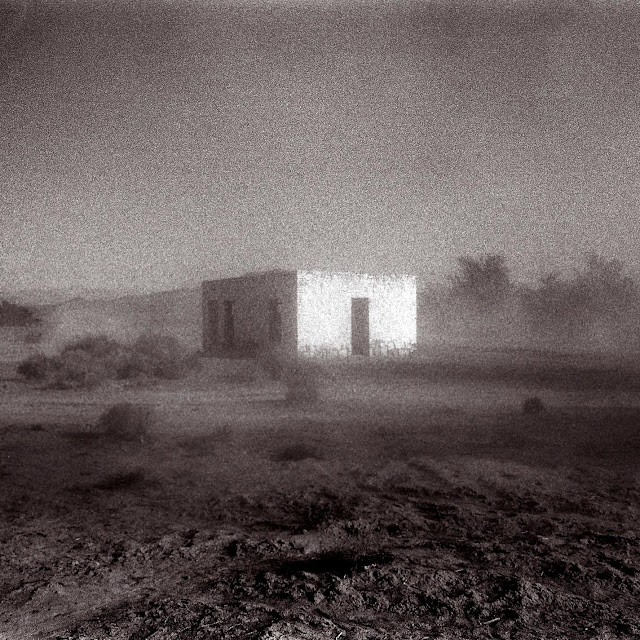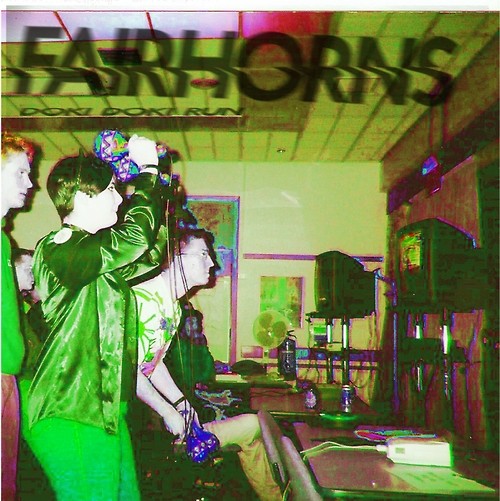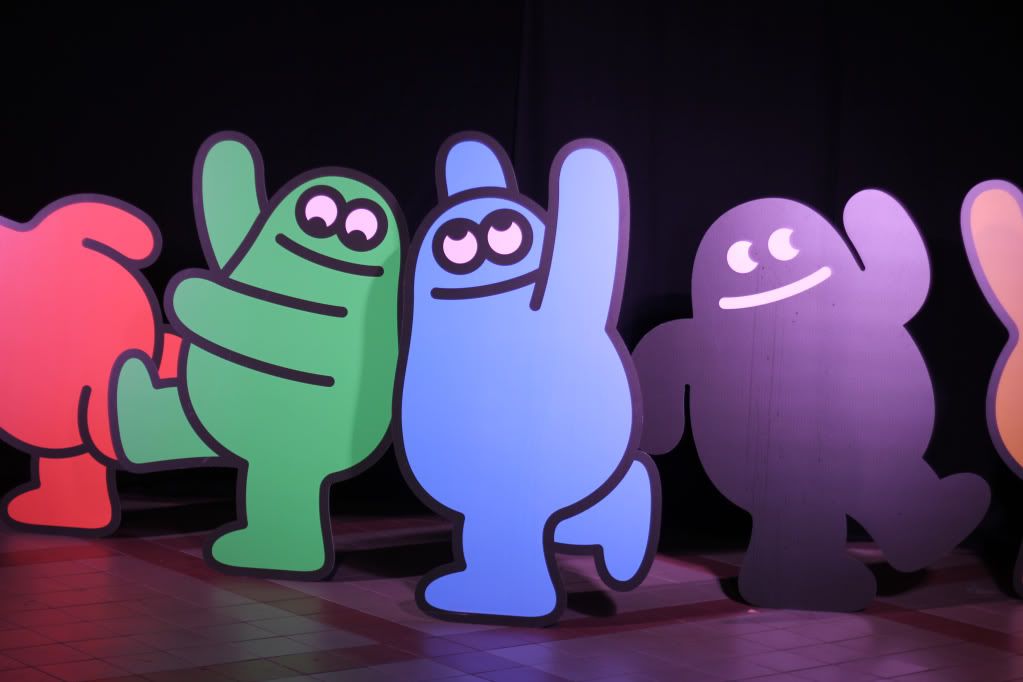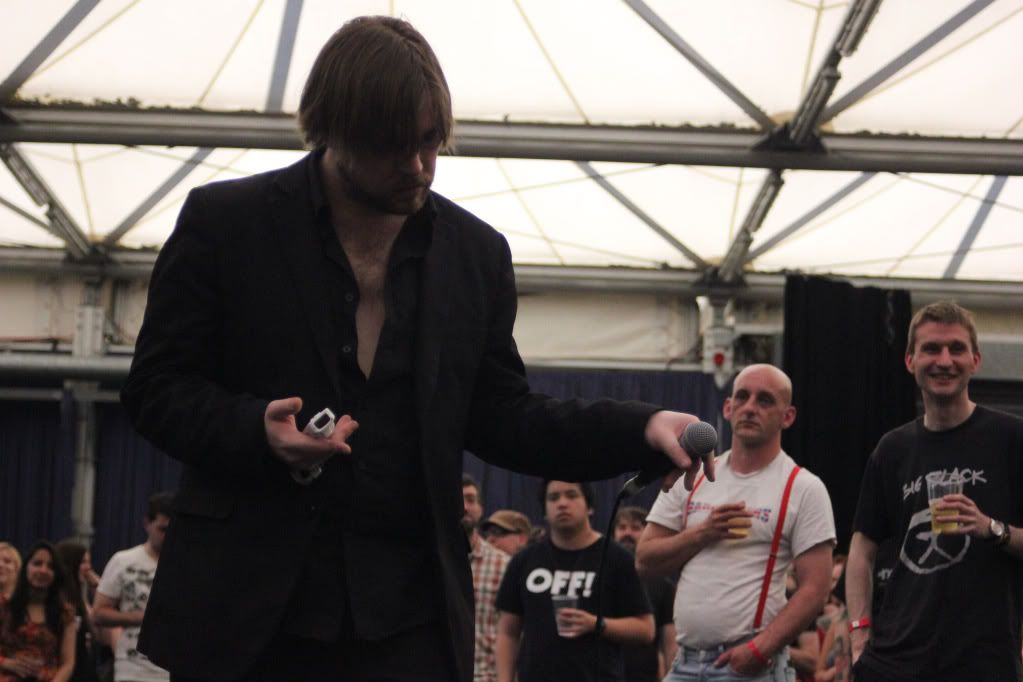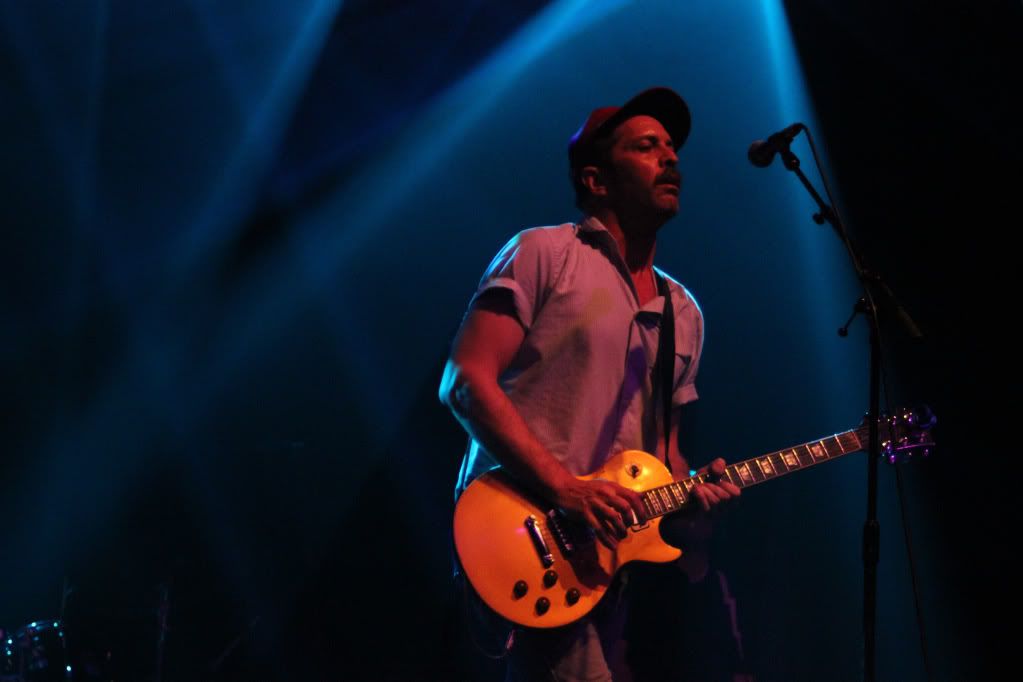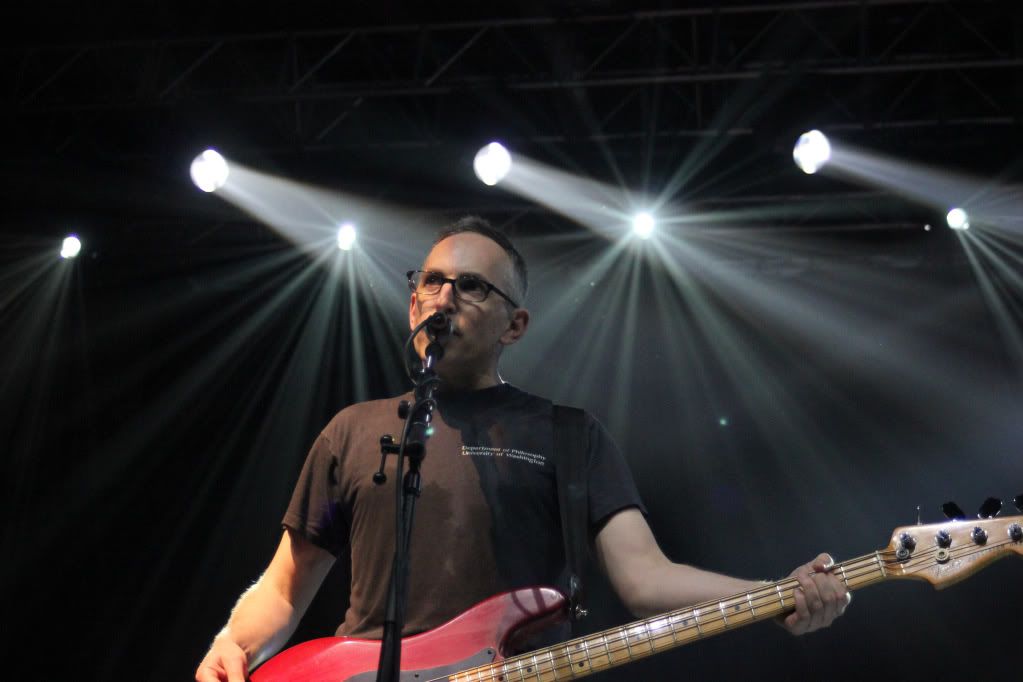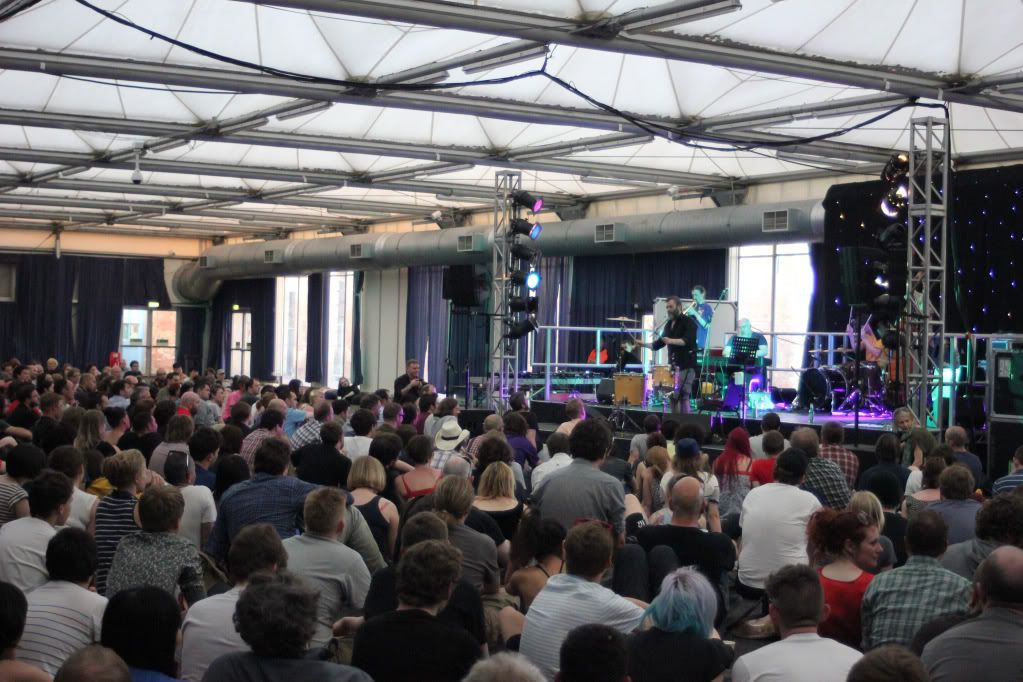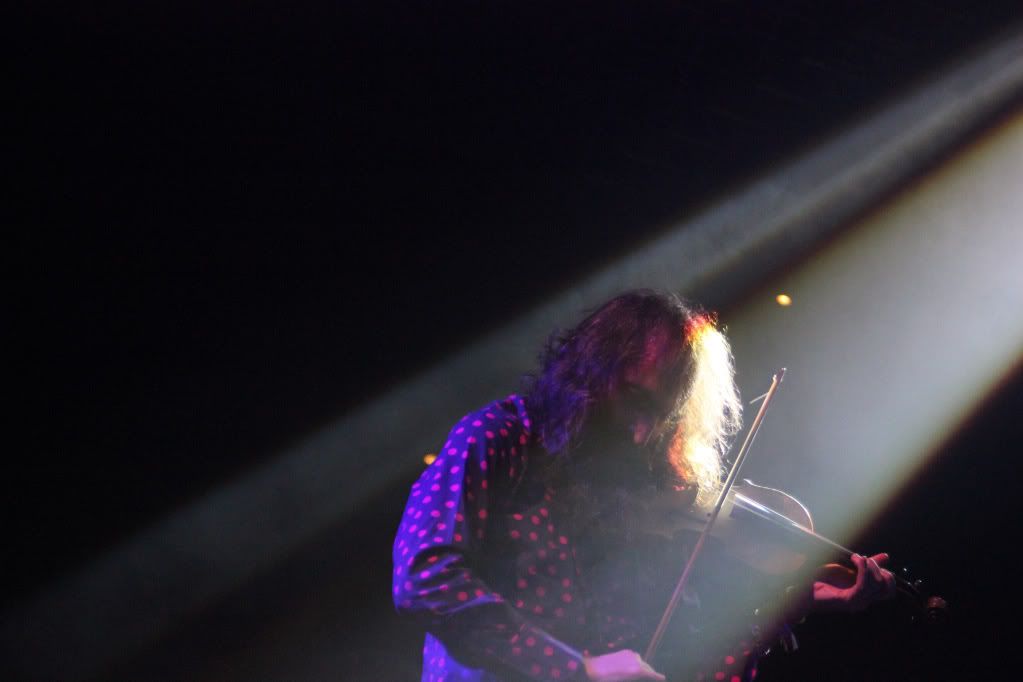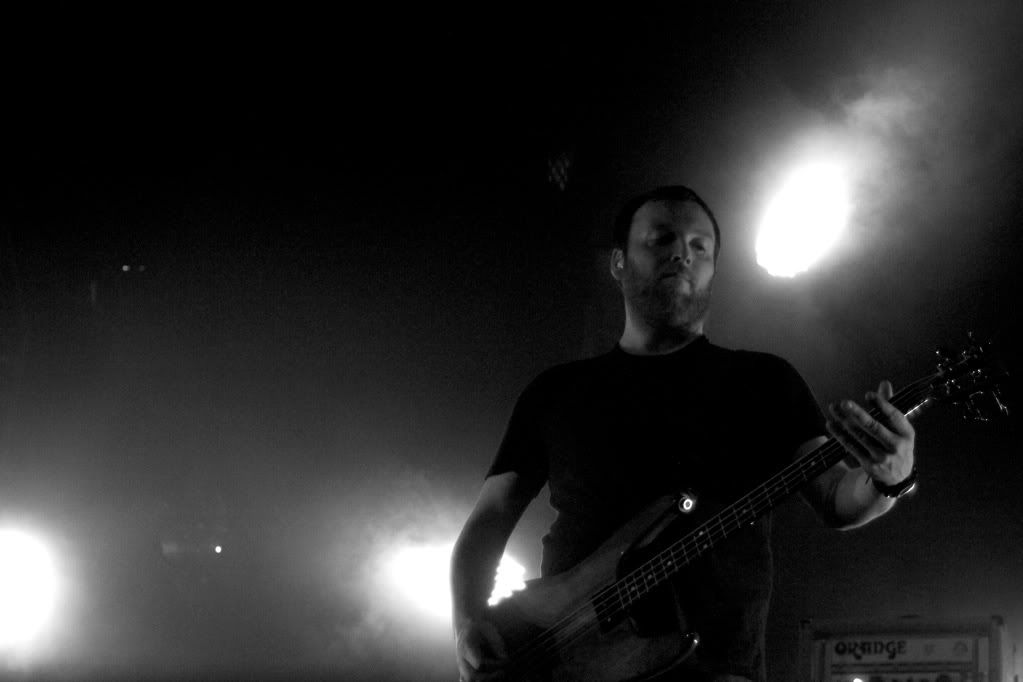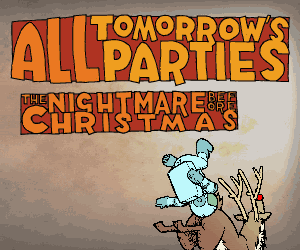Stylistically, Saturday is immediately all but incomparable with that which preceded it a touch over twelve hours prior to. From thrash metal to trashy Italo disco-infused flamboyance, the creative pseudonym of Anton Maiof – Antoni Maiovvi – not only proves an elaborate persona equal parts James Murphy, Brett Anderson (that'll be the quasi-erotic striptease midway through in the middle of the floor) and David Brent but musically he constructs something of a DFA-designed one-man Soundsystem armed only with a reconfigured Wii remote.
A seemingly tortured anti-performer, the mood and manner cultivated is exploited to maximum impact as he patrols the front few m² of the so-called yet scene-less Panorama Room like the warden of some inevitably plagued graveyard in a pastiche horror flick. Afflicted yells are equalled by scourged yelps, before he finally hurls down his microphone in apathetic exhaustion. The work here of Maiovvi (/ Maiof) is done.
Sardonic underground scuzzsters Chavez then go on to rock up and roll through forty-five that sound like Sebadoh were the Massachusetts brigade's every song gilded with the scintillating gold of Matt Sweeney's Gibson; like an emotionally secure Rival Schools. An expansive mélange almost exclusively entrenched in the minor key, if all the songs are "kinda alike; that's rock music" then they're equally consistently excellent as they pertain to an ideal amount of crunch located somewhere between fuzzy eardrum and fracturing tibia. "You guys are fuckin' intense", Sweeney jocularly concludes in the show's closing moments and as pints previously snared in plastic fly skywards it's been an intensely agreeable stint.
It's implausible to the point of the impossible to not operate on the pretence that ATP is rarely proven to be in any way misguided; musical or otherwise. Hurl tonight's joint curators and headliners into the mêlée and the whole thing becomes ever more reliably wonderful. Thus although Luis Vasquez' The Soft Moon comes across as yappy, half-baked electronica generica the reemergence of NYC sadcore creators Codeine in a show as rare as it is unapologetically bleak swings things right back round in favour of the ever-favourable pairing of Hogan and 'Lord Braithwaite': architects of the first ever All Tomorrow's Parties at Pontins atop Camber Sands. Beneath a haze of gleam brighter than the lustrous daylight outside, not only is the raw power enshrined deep in every dim nook of the discography plaintively exposed, but the inevitable becomes entirely inescapable: Codeine got old. It seems nonsensical, what with the majority of press shots and so on and so forth exhibiting pallid, depilated teens although that such evidence of their initial existence is now knocking on thirty-plus, logic subsequently takes hold. And it's logic that translates quite precisely too to song: "D for effort/ D for intent/ D because you pay the rent", Stephen Immerwahr dispassionately and ultimately disparagingly mutters and however short this reunion tour of sorts may be he no longer looks the type to scrimp on lease due dates. "I went to school to learn/ But it didn't work" he slouchily avows on Tom and similarly he now better resembles teacher than truant yet here we stand, in the presence of a sort of gawky, disintegrate-in-direct-sunlight band that'll all too soon recede from whence they came, the Median lyric "One foot on the platform/ One foot on the train" demonstrative of the precariousness to their position. Immerwahr et al. could teach a thing or two to absolutely any aspiring being out here or in on the bill. That they do so without even so much as a smidgen of self-belief however is yet more instructional (they meekly contend to Pick Up Song categorically not being "about picking someone up") as they chalk up a reclusive anthemia for the woebegone and lonesome. As such, you can't help but wish that they were back aboard for the entirety of the journey. Yet like Chavez before them, they explicitly reference the stylistic similarity to course through the back catalogue: the soporifically hushed and typically dolorous Washed Up is introduced as "the last song we wrote as a band and it's actually a lot like all the other songs." Indubitably it's the sort of track that's conducive to the constructing of the lengthiest of queues at the nearby coffee stall, yet the relentless lugubriousness of the show proves as capable of reducing to impulsive quiver as any caffeine-based beverage. It's Barely Real however – the aural epitome of dismal frog-clogging-throat despondency – that sees the band at their lowest point emotionally yet their highest artistically, as Immerwahr slides stainless metal up and down the length of his frets like gelid fingers fumbling the length of a neck primed for asphyxiation. "Thanks to Mogwai for not taking no for an answer a couple times" he asserts although we're now left feeling forever indebted to a trio perhaps never to play London again.
Consequently the hula-hooping, humbucking guitars of Mark Arm's Mudhoney seem all but entirely irrelevant to both history and the here and now with the frat rap of I'm Now sounding excruciatingly antiquated. In the meantime, Bill Wells & Aidan Moffat fabricate a school assembly ambience in the Panorama Room as the aches of crossed legs are offset by the most comforting of crestfallen songsmithery. A superlative fusion of melancholia musical and spoken word, it's a pairing as naturally wondrous as the point at which "the lucky sperm and egg collide" and certainly The Greatest Story Ever Told is one of the finest songs exhibited all weekend.
Warren Ellis then appears. A Biblical figure in both cult appeal and facial mane, he eagerly hollers Francophonic demandes at the sound desk as he thumps thumbs down anxiously atop electric piano. He'll later satirically voice his craving to be made to "sound like fuckin' Black Sabbath" but for now, blazer shed, he witters some spindly yarn about Bono, this protracted intro eventually tumbling into the strenuous yet unrestrained runaway tumult of Furnace Skies. Sometimes I Forget You've Gone follows, and although loose and expectedly improvisational, neither feel as languorous as they may on the Dirty Three's latest, Toward the Low Sun. Still coming down off Codeine it's most probably for the best and correspondingly Ellis' patent elation in performing rubs off in every right way as he extemporaneously kicks and spits like a ne'er-do-well mule destined for the slaughterhouse. Again quite aptly, the way in which Jim White lashes out at his cymbals recalls the lacerating actions of a butcher hacking up a swine into fat-stained hocks as the trio demonstrate a degree of virtuosity to rival the Great Hall headliners of the previous soir.
Although no matter how endearing a faithful interpretation of Rising Below may be (it tonight sounds like some bona fide hit wheeled out on brogue-footed parade), or how entertaining it may seem to see Ellis kickstart everything both emotionally and musically as he concertedly attempts to hurdle nonexistent stables, this best of 'Bad Seeds illustrates himself as being as fine a raconteur as he is a conductor. Given the exclusively instrumental narratives of the trio's work – led of course by the emotivity-laden fiddling of he – tales fantastic and fanciful add a hitherto unexpected sense of context to their every evocative title. Therefore there's more to each and every one than that which immediately meets the ear: the tempestuous marine rollick of The Pier, for instance, is allegedly about realising that "the world is a much better place when you're on your own" and that any inclination to wrap up everything and everyone you know and love in a blanket only to whisk it away somewhere supposedly serene ain't worth the while. Although it may sound as solitary as any number, it is resultantly imbued with yet more distinctly human sentimentality, comforting whilst simultaneously evoking the feeling of being the only one in the Western World; let alone the West Hall. The Arabesque schmooze of Some Summers They Drop Like Flies meanwhile is advocated as the precise moment at which to "dance"; to "reach out for whatever's next to you and give it a squeeze", Ellis writhing to its tense and broody intro as though he may have extended an arm only to throttle some perilous voltage. However irrespective of the colourful tangents concerning Mudhoney, and his dearest 'Sabbath in the '60s, and getting jacked up on outdated tins of paint in a vain attempt to rectify the failings of the European Economy it's the flittering between cerebrum-bruising and heart-caressing propensities that sets this specific show apart, for a rare strand of feeling is threaded throughout. Whether it be Ellis yodelling gruesomely into his strings like some confused avifaunal specimen on a spectacularly unruly The Restless Waves or the whispered sweet nothings of sticks jazzier than his polka dot-speckled shirt on Ashen Snow, you just wind up wishing you could snuggle up in that sizeable beard of his and cross la Manche as he strides across the thing atop those nimble limbs.
Given the ensuing ubiquity of the inimitably Scottish brogue you'd be forgiven for thinking you'd been teleported back in time to late 2010; to Bowlie 2 and although headliners and co-curators Mogwai may initially snag on technical fault, once strobe and sound are precisely synchronised theirs is a masterful set. Predictably accomplished perhaps, although almost magisterial nonetheless. Condensing the catalogue down into a little over an hour, from the elegiac 2 Rights Make 1 Wrong to the gently eruptive Auto Rock it feels as though when Mogwai and ATP collide everything is but meet and right as you find yourself swept out to the edges of all you know, clinging to Stuart Braithwaite's impressionistic guitar-impersonating-bagpipe rambunctiousness. 2 Rights? Too right.












